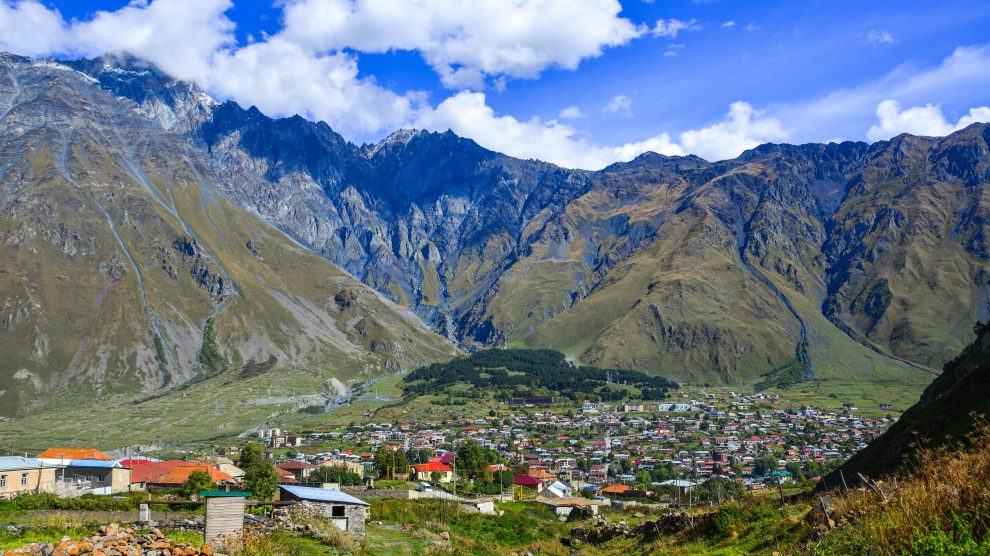Georgia’s mountains define the Caucasus country and offer a spectacular array of natural wealth. A number of international organisations are now working to ensure that they also offer inhabitants a high quality of life.
Mountains, many of them spectacular, occupy 65 per cent of Georgia’s territory, providing the country with priceless resources such as clean energy and water, as well as offering ideal locations for farming, recreation and tourism.
However, highland residents face high rates of poverty and high risks from the devastating weather extremes that come with climate change.
International Mountain Day last week offered the various organisations and agencies working to improve the quality of life in Georgia’s mountain regions the opportunity to shine a light on the challenges faced by those living there.
One of these organisations is the United Nations Development Programme (UNDP), which, together with Switzerland and Austria, as well as the Georgian government, is helping to address the economic, environmental and social challenges faced by Georgia’s highlands and create policies and programmes aiming at preserving and developing these unique regions.
‘Survive and thrive’
“Starting with majestic Kazbegi, mountains are the defining visual image of Georgia,” says Louisa Vinton, head of the UNDP mission in Georgia. “The people who live in Georgia’s highlands are hardy and resilient by nature. But they need support to protect their livelihoods and their natural surroundings. UNDP is working to ensure that this distinctive feature of Georgian culture can survive and thrive.”
“Highland development is a priority for the government of Georgia, building on successful examples from our partner countries,” says Georgia’s Deputy Minister of Regional Development and Infrastructure Mzia Giorgobiani. “We pay particular attention to ensuring access to services, economic activities and decision-making for people living in mountainous municipalities. Mountains are the natural, cultural, economic and social heritage of Georgia. They must be cherished and protected.”
Economic challenges and environmental hazards are some of the reasons behind depopulation and exodus of youth from the highlands – half of all settlements of Georgia are located in high mountain areas but only 9.7 per cent of the country’s 3.7 million people live there.
Swiss and Austrian expertise
To counter the deprivation and boost economic growth, UNDP is currently running a robust 5.5 million US dollars regional and local development programme supported by Switzerland and Austria, with a special focus on mountainous regions.
“Switzerland, as a mountainous country itself, is very well aware of the challenges that highlanders face. This is the reason why we are eager to share our experience and support economic initiatives driven by the local communities,” says Dr Danielle Meuwly, regional director of the Swiss Cooperation Office for the South Caucasus. “Local people know best what is needed for mountainous regions and have thus to be part of the decision-making process.”
“Systemic assistance to vulnerable and marginalised communities such as those living in the highlands, is at the heart of Austria’s assistance to Georgia,” adds Alexander Karner, head of the Austrian Development Cooperation (ADC)’s local office in Tbilisi.
“A substantial part of our support is dedicated to community and municipal initiatives, including sustainable mountain tourism and organic agriculture. We firmly believe that lasting development can only be achieved with the active engagement of citizens.”
Local economic development
Georgia adopted a law to develop its high mountainous regions in 2015, paving the way for systemic policy efforts to address highland challenges.
In 2019, with assistance from UNDP, the Swiss Agency for Development and Cooperation (SDC) and the ADC, the government endorsed the country’s first four-year Strategy on the Development of High Mountainous Settlements, committing new funding of 240 million US dollars for the period of 2019-2020 to promote economic development, improve social welfare and expand access to people who live in Georgia’s highest mountain regions.
Since 2016, nearly 1,800 settlements in Georgia have received ‘high mountain’ status and many have benefitted from UNDP projects that aim to support local entrepreneurship, renewable energy, waste management and environmental tourism.
With support from Switzerland and Austria, UNDP provides funding for community and municipal initiatives focused on local economic development.
So far, seven highland municipalities have been awarded a total of 195,000 US dollars, with over 65,000 highlanders benefiting from the projects.
In addition, community and civil society organisations in nine mountainous municipalities received 266,000 US dollars for local development initiatives, benefiting over 4,000 highland residents.
—
Unlike many news and information platforms, Emerging Europe is free to read, and always will be. There is no paywall here. We are independent, not affiliated with nor representing any political party or business organisation. We want the very best for emerging Europe, nothing more, nothing less. Your support will help us continue to spread the word about this amazing region.
You can contribute here. Thank you.








[…] Making Georgia’s mountains a better place to live […]